- Home
- Jennifer Donnelly
Revolution Page 4
Revolution Read online
Page 4
“Please come. I want you to,” he says. His lips brush mine. He tries for a kiss.
Bad idea. The very worst. I push him away. “Dude, hey. I’m not radicchio.”
“What?”
“Radicchio. You know? The nasty red lettuce? All those goddesses you sleep with, Nick, they’re cloying your palate. You’ve had too much sweet stuff and now you’re craving something bitter.”
Nick laughs himself silly. Pot makes anyone sound funny. Even Letterman.
“I gotta go,” I say, breaking away.
“Andi, wait.”
But I don’t wait. I can’t. Standing here on Henry Street with him brings it all back. He doesn’t remember much. At least, that’s what he says. But I think he remembers everything and that’s why he gets high all the time.
He lets me get ten steps down the sidewalk, then says, “I’ll take out my godfather’s guitar.”
Wow. The big guns. His godfather happens to be Keith Richards.
I turn around. “What do you want from me, Nick?” I ask him. There’s an edge to my voice.
“It’s gorgeous,” he says. “He used it when he wrote ‘Angie.’ ”
“What do you want? Can’t be sex. You get plenty. Can’t be drugs. You’ve got more pills than CVS. You need help with your French homework? Is that it?”
“He gave it to me last month. When I was in England,” he says. His voice is soft now. Pleading.
I almost say it out loud. I almost spit it at him, the word for the thing he wants—forgiveness. But then the pot haze lifts and his eyes meet mine and I can see the pain there. So I don’t say it. I let him be nice to me. It’s not what he wants, but it’s the best I can do.
“You’re blagging,” I tell him. “It’s not Uncle Keith’s. You bought it on eBay.”
He smiles. “I’m not. It’s his,” he says.
“Yeah? What kind is it?” I say, testing him.
“It’s a … um … it’s a Fender Bender. No, it’s a Paul Gibson sort of thing … some kind of stratoblaster. Bugger me, I don’t know what it is. But it’s his; I swear it. We’ll call him up and he’ll tell you. He gave it to me. If you come, I’ll let you play it.”
“Okay. I’m there.”
I pick up my bags, tell him goodbye, then walk past Arden. If looks could kill, I’d be vapor. “Hey, thanks for the invite,” I tell her. She doesn’t deign to reply to me. She’s saving all her lovin’ for Nick.
“Why didn’t you just hook up with her right there on the sidewalk, Nicky? You wanted to. The whole world could see that!”
“Piss off, Arden, will you? You’re giving me a headache.”
Ah, young love.
I smile as I turn onto my street. Winter break’s looking up. I decide to give Vijay a call, see if he’ll go with me. Apart from that guitar, which I very much want to play, this party has possibilities: bored rich boys, jealous rich girls, plenty of illegal substances, maybe even a loaded gun.
If I’m lucky.
7
Turns out I’m not. Lucky, that is. Not remotely.
The party’s crap. Literally. I’m not in Nick’s house for ten seconds before a drippy white pile of it lands on my shoulder.
I look up. Above me, a huge green parrot sits preening in a chandelier.
Rupert Goode, Nick’s dad, hobbles up behind me with a dishrag in one hand. “Iago, you scoundrel!” he shouts, shaking his cane at the bird. “I shall wring your neck! I shall pluck you and gut you and stuff you into the oven!”
“Why, thou silly gentleman!” Iago squawks, flying off to strafe someone else.
“I’m so sorry, my dear,” Rupert says. “He’s a blackguard, that bird. Allow me.…”
Rupert’s an actor. He played every male lead Shakespeare wrote, made a ton of indie films, then cashed out with four or five Harry Potters. He can’t work much anymore. He shakes. His voice is still beautiful, though. The Parkinson’s hasn’t ruined it yet.
I look around as he wipes the poop off me, eyeing the water-stained wallpaper in the hallway and the crumbling ceiling above it. A faded painting in a battered frame. A reeky terrier asleep on a coat. Teetering piles of scripts. If it belonged to anyone else, this house would be on the city’s condemned list, but since it’s Rupert Goode’s, it’s in Vogue.
“I don’t see you anymore,” Rupert says. “I used to see you at Cranberry’s with Marianne, getting coffee in the morning.”
He’s friends with my mom. Or used to be. Back when she had friends.
“I’ve been really busy. Senior thesis. College applications. You know.”
What he knows is that I’m lying.
“How are you, Andi? Really?” he asks, giving me a searching look.
“I’m fine,” I say, looking away. He cares. I know that. Which is why I don’t tell him how I really am.
“No, I don’t think so. How could you be?” he says. “I never think of that day without thinking of Lear’s speech to his poor dead Cordelia. ‘Why should a dog, a horse, a rat, have life / And thou no breath at all?’ It’s a comfort, the Bard’s work. Do you find that, too? Shakespeare poses such monumental questions.”
“So does SpongeBob. Problem is, they both fall short on the monumental answers.”
Rupert laughs but his eyes are sad. “Nick misses you. So do I,” he says. Then he hugs me. People do that a lot. It seems to help. Them.
“Off you go, then. Join the fun,” he says, handing me a pink paper parasol.
“Um, Rupert? It’s not sunny in here.”
“It’s a shield, my dear. Iago’s bad, but Edmund, the new one, is the devil himself.”
I pop the parasol open and walk from room to room, feeling like Cio-Cio-San searching for Pinkerton. Half my class is in the kitchen. There are empty bottles everywhere, spent cigarette packs, parrots and parasols, but no Nick.
Someone offers me a glass of wine, but I decline. Alcohol doesn’t mix well with my pills. It brings on some nasty side effects.
I started on the drugs about a year ago. I was seeing Dr. Becker, a psychiatrist, because I couldn’t eat or sleep or go to school. Beezie recommended him and my father made me go by threatening to stop my lessons with Nathan if I didn’t. I was supposed to talk about things with Dr. Becker, but I barely opened my mouth—except to say what a waste of time it all was. After a few weeks of that, Dr. Becker prescribed Paxil. Then Zoloft. When those didn’t work, he bumped me up to Qwellify, a tricyclic antidepressant. If that doesn’t cut it, it’s antipsychotic time.
I keep moving through the Goodes’ house, looking for Nick. I wish Vijay had come with me so I’d have someone to talk to, but it’s a Saturday night during winter break, so of course he’s home working on his thesis “Atom and Eve: Technology, Religion, and the Battle for the Twenty-first Century.” So far, he’s managed to get quotes from five world leaders.
I veer off into the parlor. Music’s blaring. Kids are making out on the sofa, a chair, the floor. There’s a portrait over the mantel, a huge black-and-white nude by Steven Meisel of Lady Goode IV. She’s twenty-three. And a model. And not around very much. But as Rupert himself will tell you, and often does, “With breasts like those, one can do as one likes.”
I head into the library. Shiva Mendez is sharing slides of her latest art installation, Void, which involves three hundred and sixty-five bottles of laxative and some unspeakable footage. It’s part of her senior thesis. The Whitney’s including it in an emerging-artists show. Bender Kurtz, fresh out of rehab for the second time this year, is talking up his thesis—a memoir of addiction. He’s already got a book deal. Now he’s trying to pimp the film option. “My agent’s really excited,” he’s telling some girl. “Wes might attach.”
They make me feel tired, my classmates. Achingly, crushingly, epically tired. Listening to them makes me want to lie down on the floor and sleep for twenty years, but I can’t—there’s too much bird poop on the rug—so I decide to leave. Nick’s nowhere in sight. At least, not anywhere down here. He mig
ht be upstairs, but I’m not brave enough to start opening bedroom doors in this house. As I head for the hallway, I feel an arm circle my waist and lips press against the back of my neck. A gravelly voice says, “I knew you’d come. But who did you come for? My guitar or me?”
“Your guitar. Most definitely.”
“Coldhearted siren,” he says, tugging on one of my earrings, and then hands me the guitar. Like it was nothing. Like he was handing me a stick of gum.
“I can play it?” I ask. In a whisper.
“Yah. Absolutely,” he says, barely paying attention. Arden’s giggling in his ear and hooking her thumb toward the kitchen. And then they’re gone, and I’m holding Keith Richards’s guitar, and the weight of it in my hands feels thrilling and terrifying at the same time. Like I’m holding a cobra, a bag of diamonds, a bomb.
I strum it. My fingers curl around the board into A minor, E7, then G—the first chords of “Angie”—but I can barely hear them because I’m in the front hall with people all around me. I run upstairs, to the first landing, and then the second, but it’s more of the same. So I keep going, all the way up to the roof. It’s cold up here, but quiet.
There’s some old lawn furniture scattered around. I sit on a rusty chair and pull the guitar strap over my head. I’m not worthy of this, not by a long shot, but that kind of thinking only stops the best of us, not the worst. So I play. I play “Angie” and “Wild Horses” and “Waiting on a Friend.”
I play until my fingers are blue and stiff from the cold, and then I keep on playing. Until I’m lost in the music. Until I am the music—the notes and chords, the melody and harmony. It hurts, but it’s okay because when I’m the music, I’m not me. Not sad. Not afraid. Not desperate. Not guilty.
I play for an hour or so, then jam my hands into my pockets and walk around, looking up at the night sky. I can’t see any stars. I almost never can in Brooklyn. They fade away in the sodium glare. But I can see the Templeton, dark and ugly. The windows of its shiny new apartments are all lit up. Here and there, a Christmas tree twinkles.
It was almost Christmas then, too. The day Truman died. It was cold and there were lights in the shop windows. A guy was on the corner, selling trees. Christmas carols were playing. Max was standing on the sidewalk, shouting.
I don’t remember Christmas Day that year. I remember taking the tree down, though. In April. It had turned brown and dropped its needles. There were still presents under it. No one wanted to open them so Dad put them in garbage bags and took them to Goodwill.
I start walking. It’s nine steps from where I’m standing to the edge of the roof. I count them as I go. Then one step up to the cornice. And then I’m looking at the street below. It would be so easy. One more step and it would be over. One small step, and no more pain, no more anger, no more anything.
A voice behind me says: “Please don’t. Really. Please.”
I turn around. “Why not?”
Nick says, “Because I’d miss you. We’d all miss you.”
I laugh out loud.
“All right, then, I’d miss that guitar. I really would. So put it down before you jump, okay?”
I realize I’ve still got Keith Richards’s guitar strapped around me. I would have taken it with me and smashed it to pieces. I’m horrified. I take a step toward him, down off the cornice. “I’m sorry. God, I’m really sorry, Nick—”
And then my foot lands on a patch of ice and I lose my balance and I’m twisting and screaming and Nick grabs my arm and it feels like we’re both going over, but then he jerks me toward him and I stumble back onto the roof.
He lets go of me and lets loose on me. He’s yelling. Loudly. His voice is raspy and ragged. I don’t know what he’s saying because my heart is pounding in my ears. I don’t know what to do so I put the guitar down and try to leave because I think that’s what he wants, but no.
“Pick it up!” he shouts. “Pick it up and play something. It’s the least you can do. You nearly killed us both.”
So I do. Crappily. Because my hands are shaking. I start with “You Can’t Always Get What You Want,” which seems fitting in the circumstances. Then “Far Away Eyes.” And “Fool to Cry.” And then I stop to warm my hands.
Nick doesn’t say anything. He’s totally quiet and I’m guessing he’s still really mad, or thinking that I suck, but then he says, “That was amazing. Play something else.”
“I can’t. My fingers are frozen.”
He comes close, takes my hands in his, and blows on them. His breath is wine-sweet and warm. He smells good. And he looks good. And when he takes my face in his hands and kisses me, he feels good, too.
The guitar’s still around me. I slip it off and put it down. I want to feel him. To feel his breath on my neck. The warmth of his skin. To feel something other than sadness.
Hold me, I tell him silently. Hold me here. To this place. This life. Make me want you. Want this. Want something. Please.
And suddenly I hear, “Oh. My. God.”
It’s Arden. She’s here. On the roof.
“You’re such a jerk, Nick!”
“Arden … It’s not … It’s nothing … We were just … She was upset, you know? And I was …”
Arden throws a beer bottle at him. It smashes against the chimney. The shouting starts.
“You better go,” he tells me.
I do. Quickly. Down the ladder, down three endless flights of stairs, and out the door. I’m halfway down Pineapple Street but I can still hear them shouting on the roof.
“I can’t believe you! I don’t mean anything to you, do I?”
“I told you it was nothing!”
It never is. Never was. Why didn’t I jump when I had the chance?
8
“Mom?” I shout as I open the door to my house. No answer, which is not unusual, but the fact that the house is all lit up is. “Why is it so bright in here?” I mutter. “Mom?”
Footsteps come, hard and quick, from the parlor.
“Where were you?”
That voice. Those words. They stop me cold. They were exactly what he said to me that morning. The day Truman died. Only he shouted them at me. Over and over again.
“Well, hey, Dad,” I say. “Long time, no see. How’s all that D, N, and A?”
“Where were you?”
“At a party. At the Goodes’ house.”
“The Goodes? Andi, don’t tell me you’re dating Nick Goode.”
“I’m not.”
“Thank God.”
“I’m dating Rupert.”
His face darkens. “Is that supposed to be funny? Because it’s not. Why do you always have to be so …”
Horrible? Terrible? Downright shitty? So I can pretend we’re standing ten feet apart with no hugs, hellos, or how-are-yous after not seeing each other for four months because I’m being shitty. Not because we hate each other.
“… caustic. This is unacceptable. Totally unacceptable. Why didn’t you call me? Why didn’t you tell me?”
“About Nick’s party?” I say, confused.
“About St. Anselm’s! About your grades. The paintings. Your mother. Why on earth didn’t you tell me about her?”
I panic. “What’s wrong? Where is she? Does she know you’re here?”
I’m scared that he’s upset her. He has a way of doing that. I blow by him and run into the parlor. To my relief, she’s there. Painting. Just painting.
“Hey, Mom,” I say. “You hungry? Want some cereal?”
She shakes her head.
“Dad? Cereal?”
“No, I—”
“Toast?”
“What I want is an explanation!” he shouts, gesturing to the walls.
“They’re paintings. Mom’s a painter, remember?”
He turns around in a slow circle. “Every wall is covered with paintings. Completely covered.”
He’s right about that. She’s started to nail them to the ceiling.
“There must be two hundred of them,�
�� he says. “All of Truman. How long has this been going on?”
“I don’t know. A few months.”
“Months?”
“Look, she’s happier this way. When she’s painting she isn’t crying or screaming or throwing things, okay? What do you want, Dad? Why’d you come?”
He stops staring at the ceiling and stares at me. “Because I …” he begins. But his words fall away. He looks confused. He looks flustered and sorry. Like you do when you run up to someone you think you know and take her arm and she turns around and you were wrong.
“Because I got a letter from St. Anselm’s,” he finally says. “I called you about it. Twenty times. No one answered. I left messages. No one called back. So I got on a plane. Ms. Beezemeyer says you’re failing all your classes. That you’re going to be expelled. What the hell is going on, Andi? Are you taking your pills?”
“Yes, I’m taking my pills, and for the record, I’m not failing all my classes. I got an A in music. Did Beezie mention that?”
He doesn’t hear me. Or pretends he doesn’t.
“Two years ago, you were a straight-A student. You won prizes in French and biology.”
“And music.”
“I don’t understand this. I don’t understand you. What’s happened to you?”
I look at him in disbelief. “Are you serious? You’re asking me that? Seriously? Did you catch Alzheimer’s or something?”
He’s silent for a few seconds. All I can hear is the sound of Mom’s brush against her canvas and the mantel clock ticking.
Then he says, “Damn it, Andi, Truman’s dead.”
“I’m aware of that.”
“So let him go.”
“Just like you’ve done, right? New life. No strife.”
“Truman died. Truman. Not you,” he says.
“I know. Unfortunate, isn’t it? For all of us.”
He looks like somebody tackled him. He sits down in a chair, covers his face with his hands. “God, what am I going to do?” he says softly.
This is it. The big reconciliation scene. Where I run to him and he holds me and we cry bright silver tears and everything is better. I wait for the music to start. I wait for someone to cue the violins. For the cheap Hollywood score to kick in. But it doesn’t. And it won’t. I know that. I’ve been waiting for two years.

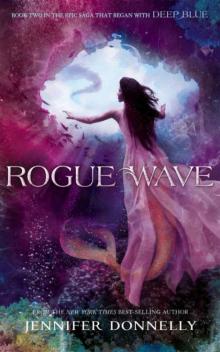 Rogue Wave
Rogue Wave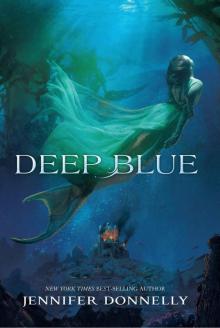 Waterfire Saga, Book One: Deep Blue (A Waterfire Saga Novel)
Waterfire Saga, Book One: Deep Blue (A Waterfire Saga Novel)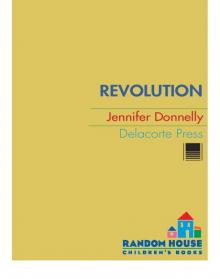 Revolution
Revolution The Wild Rose
The Wild Rose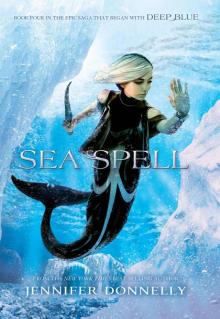 Waterfire Saga (4 Book Series)
Waterfire Saga (4 Book Series)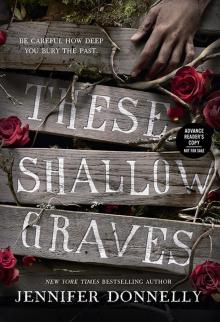 These Shallow Graves
These Shallow Graves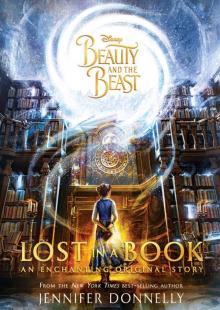 Beauty and the Beast: Lost in a Book
Beauty and the Beast: Lost in a Book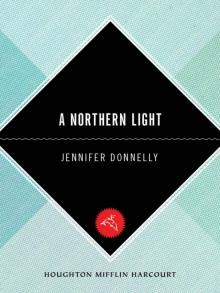 A Northern Light
A Northern Light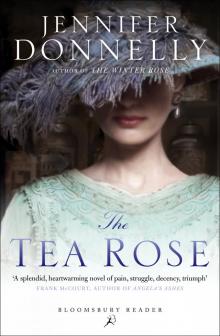 The Tea Rose
The Tea Rose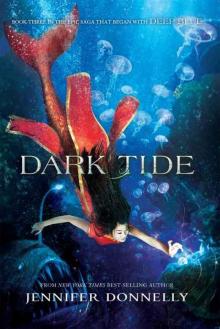 Waterfire Saga, Book Three: Dark Tide: A Deep Blue Novel
Waterfire Saga, Book Three: Dark Tide: A Deep Blue Novel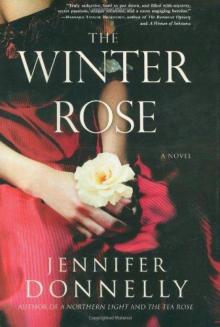 The Winter Rose
The Winter Rose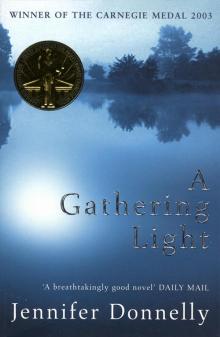 A Gathering Light
A Gathering Light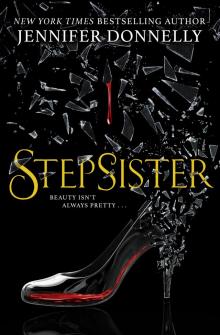 Stepsister
Stepsister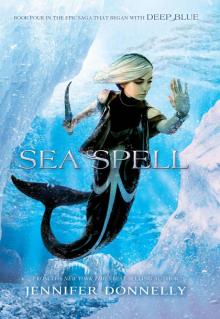 Waterfire Saga, Book Four: Sea Spell: Deep Blue Novel, A
Waterfire Saga, Book Four: Sea Spell: Deep Blue Novel, A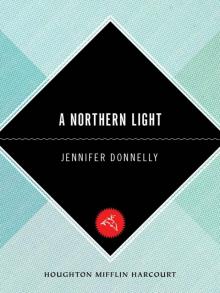 Northern Light
Northern Light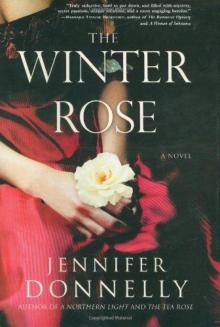 Winter Rose, The
Winter Rose, The